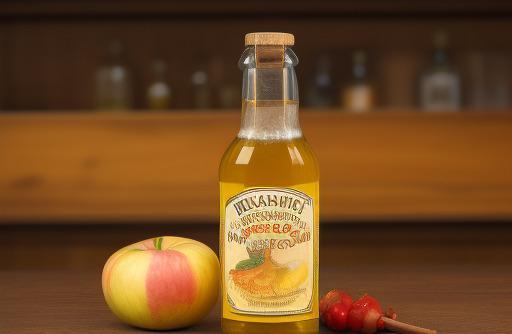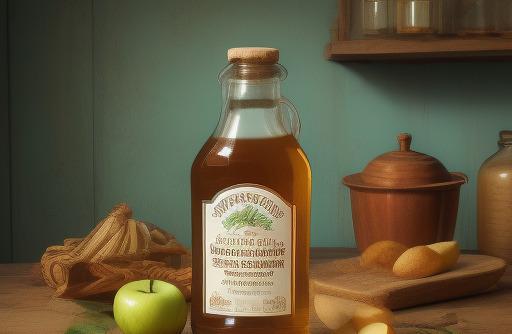Best Substitutes For Apple Cider Vinegar

Apple cider vinegar has gained popularity for its numerous health benefits and versatile uses in cooking and cleaning. However, there may be times when you run out of this pantry staple and need a suitable substitute. Whether you’re following a specific recipe or looking for an alternative for health reasons, there are several options to choose from. In this article, we will explore the best substitutes for apple cider vinegar, their uses in different recipes, and tips for choosing the right substitute.
Key Takeaways
- Apple cider vinegar is a popular pantry staple known for its health benefits and culinary applications.
- When you run out of apple cider vinegar, there are several substitutes available such as white vinegar, lemon juice, red wine vinegar, and more.
- The choice of substitute depends on the recipe and desired flavor profile.
- Experimenting with different substitutes can add new dimensions to your culinary creations.
Why You Need A Substitute For Apple Cider Vinegar
There are several reasons why you may need a substitute for apple cider vinegar. Here are a few common scenarios:
-
Allergy or Intolerance: Some individuals may have allergies or intolerances to apple cider vinegar or its components. In such cases, finding a suitable substitute allows you to enjoy recipes without compromising your health.
-
Acidity Level: Different types of vinegar have varying levels of acidity, measured by their pH value. If a recipe calls for apple cider vinegar and you don’t have any on hand, you’ll need a substitute with a similar acidity level to maintain the balance of flavors.
-
Flavor Profile: Apple cider vinegar has a unique flavor profile, with a mild fruity tang and a hint of sweetness. Depending on the recipe you’re making, you may want to experiment with other vinegars or citrus juices to achieve a slightly different taste.
-
Availability: Apple cider vinegar may not always be readily available in your pantry. Having knowledge of suitable substitutes ensures you can continue cooking and experimenting, even if you run out of this particular ingredient.
Types Of Substitutes For Apple Cider Vinegar

When looking for a substitute for apple cider vinegar, you have several options to choose from. The most suitable substitute will depend on the recipe and the desired flavor profile. Here are some common types of substitutes:
-
White Vinegar: White vinegar is one of the closest substitutes for apple cider vinegar in terms of acidity. It has a neutral flavor, making it versatile in various recipes. However, it lacks the fruity and subtle sweetness of apple cider vinegar.
-
Lemon Juice: Lemon juice is an excellent substitute due to its high acidity level. It adds a bright and tangy flavor to dishes, which can complement a wide range of recipes. Keep in mind that lemon juice may alter the taste slightly, as it lacks the sweetness of apple cider vinegar.
-
Red Wine Vinegar: If you’re looking for a substitute with a similar fruity flavor, red wine vinegar is a good option. It adds a rich, slightly sweet taste to dishes. However, red wine vinegar has a stronger flavor compared to apple cider vinegar, so use it sparingly.
-
Rice Vinegar: Rice vinegar, commonly used in Asian cuisine, has a milder flavor compared to apple cider vinegar. It has a slight sweetness and is less acidic. While it may not be an exact substitute, it can still work well in many recipes.
-
Balsamic Vinegar: Balsamic vinegar has a rich and complex flavor profile, with a good balance of sweetness and acidity. While it may not be suitable for every recipe due to its distinct taste, it can be a good substitute in certain dishes, particularly those that benefit from its sweet undertones.
-
White Wine Vinegar: White wine vinegar has a mild and slightly fruity flavor. It is less acidic compared to other vinegars, making it a suitable substitute for apple cider vinegar in recipes that require a milder tang.
These are just a few examples of substitutes for apple cider vinegar. The choice will ultimately depend on your personal taste preferences, the specific recipe, and the availability of ingredients. Experimenting with different substitutes can be a fun way to explore new flavor profiles in your dishes.
Pro Tip: When substituting apple cider vinegar with lemon juice, use a 1:1 ratio. However, if the recipe calls for a large quantity of vinegar, start with a smaller amount of lemon juice and gradually adjust to taste, as lemon juice can be more potent in flavor.
Best Substitutes For Apple Cider Vinegar
Now that we’ve discussed the various types of substitutes for apple cider vinegar, let’s delve into the best options for different culinary uses.
-
White Vinegar: This is an all-purpose substitute for apple cider vinegar, suitable for most recipes. Use it in pickling, dressings, marinades, sauces, and baking. It’s important to note that white vinegar has a stronger flavor than apple cider vinegar, so adjust the quantities accordingly.
-
Lemon Juice: Lemon juice is particularly well-suited for salad dressings, marinades, and beverages. The vibrant citrus flavor pairs well with fish, salad greens, and fruits. It may also be used in desserts, such as lemon bars or lemon cakes, where the tangy taste can enhance the sweetness.
-
Red Wine Vinegar: This substitute is a good choice for recipes that require a fruity taste. Use it in salad dressings, vinaigrettes, and marinating meat. Its bold flavor can add depth to dishes, but use it sparingly as it can overpower more delicate flavors.
-
Rice Vinegar: With its mild flavor, rice vinegar is a suitable replacement for apple cider vinegar in Asian-inspired dishes. It works well in sushi rice, stir-fries, and sauces. Rice vinegar also adds a pleasant tang to pickled vegetables and can be used in marinades for seafood.
Choosing The Right Substitute For Apple Cider Vinegar

Choosing the right substitute for apple cider vinegar requires considering the flavor profile of the dish you’re preparing. Here are a few tips to help you make the best choice:
-
Consider acidity: Apple cider vinegar has a pH level of around 4.5 – 5, so look for a substitute with a similar acidity level. White vinegar and lemon juice closely match apple cider vinegar in terms of acidity.
-
Flavor compatibility: Consider the flavor profile of the substitute and how it will complement the other ingredients in your recipe. For example, red wine vinegar can work well with red meat, while rice vinegar is better suited for Asian-inspired dishes.
-
Experiment: Don’t be afraid to experiment with different substitutes in your recipes. The best way to find the right substitute is through trial and error. Start with smaller amounts, taste as you go, and adjust accordingly.
Cooking With Substitutes For Apple Cider Vinegar
When cooking with substitutes for apple cider vinegar, it’s important to keep in mind the potential flavor variations. Here are some guidelines to help you navigate cooking with these substitutes:
-
Taste as you go: Whenever you substitute apple cider vinegar with another ingredient, taste the dish as you cook. This way, you can adjust the flavors and ensure the desired taste is achieved.
-
Adjust quantity: Since the intensity of flavors can vary between substitutes, start by using a smaller quantity and then add more if needed. This will prevent overpowering the dish with the substitute.
-
Balance flavors: Consider the other ingredients in the recipe and how they will interact with the substitute. For example, if you’re using a bolder substitute like red wine vinegar, you may need to adjust other flavors to maintain a harmonious balance.
Recipes Using Substitutes For Apple Cider Vinegar

Here are a few recipes that can be easily adapted with suitable apple cider vinegar substitutes:
- Lemon Vinaigrette:
- ¼ cup lemon juice
- ¼ cup olive oil
- 1 tablespoon Dijon mustard
- 1 teaspoon honey
- Salt and pepper to taste
Substitute the lemon juice with an equal amount of apple cider vinegar substitute for a tangy and delightful vinaigrette.
- Pickled Vegetables:
- 2 cups sliced cucumbers
- 1 cup sliced carrots
- 1 cup sliced radishes
- 1 cup white vinegar
- ½ cup water
- 2 tablespoons sugar
- 2 teaspoons salt
- 1 teaspoon mustard seeds
- 1 teaspoon coriander seeds
Replace the white vinegar with an equal amount of apple cider vinegar substitute to add a fruity undertone to your pickled vegetables.
- Balsamic Glaze:
- 1 cup balsamic vinegar
- 2 tablespoons honey
While balsamic vinegar already has a sweet flavor, you can substitute ½ cup of balsamic vinegar with an equal amount of apple cider vinegar substitute for a milder and fruitier glaze.
Storage And Shelf Life Of Substitutes
When using substitutes for apple cider vinegar, it’s important to consider their shelf life and storage requirements. Here are some general guidelines:
- Store vinegar substitutes in a cool and dark place, away from direct sunlight and heat.
- Most vinegar substitutes have a long shelf life, similar to apple cider vinegar. Check the specific product label for any storage instructions.
- Lemon juice should be stored in the refrigerator to maintain its freshness and prevent spoilage.
- Some vinegar substitutes may develop sediment or slight color changes over time. This is normal and does not affect their usability.
- Always check the expiration date of the substitute before using it in your recipes.
Conclusion
While apple cider vinegar is a versatile ingredient in various recipes, there are several suitable substitutes available when you run out. By understanding the types of substitutes, their flavor profiles, and how to use them, you can confidently experiment and adapt your favorite recipes. Whether you choose to substitute with white vinegar, lemon juice, red wine vinegar, or another option, each alternative brings its own unique flavor to the dish. So don’t be afraid to explore and make the most of the substitutes for apple cider vinegar available to you.
FAQS
What Are Some Alternatives For Apple Cider Vinegar?
Some alternatives for apple cider vinegar include white wine vinegar, rice vinegar, balsamic vinegar, lemon juice, and red wine vinegar.
Which Vinegar Is The Best Substitute For Apple Cider Vinegar In Recipes?
If the recipe specifically calls for apple cider vinegar, white wine vinegar is the best substitute because it has a similar acidity level and a subtle, mild flavor that won’t overpower the other ingredients.
Can I Substitute Lemon Juice For Apple Cider Vinegar In A Recipe?
Yes, lemon juice is a suitable replacement for apple cider vinegar in most recipes. However, keep in mind that it will add a pronounced citrus flavor to the dish.
Is Balsamic Vinegar A Good Alternative For Apple Cider Vinegar In Salads?
Balsamic vinegar can be a great alternative for apple cider vinegar in salads because it has a tangy and slightly sweet flavor that complements vegetables and fruits. However, use it cautiously because it has a much stronger taste than apple cider vinegar.
How Do I Know Which Substitute To Use For Apple Cider Vinegar?
It largely depends on the recipe you’re making and the flavor profile you’re looking for. If you want a milder taste, use white wine or rice vinegar. If you want a more complex taste, use balsamic or red wine vinegar. If you want a significant citrus flavor, use lemon juice. Experiment with different vinegar options to find what works best for your recipe.
Sources
About the Author Jenny
I'm Jenny, a housewife with an unwavering passion for food. My culinary journey began with my grandmother's kitchen, and it's now a full-fledged food blog. I've turned my love for cooking into a creative outlet, sharing recipes and stories with a global community of fellow food enthusiasts. It's proof that being a housewife can also mean pursuing your passions and savoring life's delectable moments.
